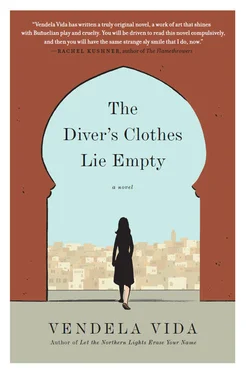You try not to run as you make your way across the lobby and up the elevator to your room. You place the backpack — the evidence — inside your suitcase, and throw your clothes and toiletries on top. You zip up the suitcase and make your way to the elevator.
But you can’t go downstairs. The pale professional woman and the tattooed man are there. The manager is there. By now they might have all figured out who you are — or aren’t.
Inside the elevator you see the button for the rooftop pool. You’ll go there, wait an hour or two until the people who were so interested in you have left the lobby.
The elevator opens directly to the pool. You walk out with your suitcase. The pool is a blue square without a diving board. You sit on a chaise longue. The sun is not yet warm enough for sunbathers and there’s only one swimmer in the pool, a woman. She stops swimming and looks at you. You can see she’s wondering what you’re doing there, fully dressed with a suitcase.
You think quickly and find the door to the women’s locker room. You wait in there. Then you realize how strange this is. The woman in the pool could report that there’s a woman who entered the changing room and never left.
Your only option to appear as normal as possible is to swim. And besides: swimming has always soothed you. You remove a dark blue one-piece from your suitcase. You didn’t bother packing a bikini because you feared it would only mock your body in its current condition. You pull on the blue swimsuit and hoist the front up over your chest, and adjust the elastic down over your rear. You stash your suitcase under a massage table that for some reason is in the changing room. Maybe they bring it outside on nice days for poolside massages.
You dive from the edge of the pool where it says NO DIVING, and swim underwater to the other side, not once coming up for air. The water is a good temperature, neither too cold nor too warm. You are not a casual swimmer. You competed on swim teams starting when you were eight, and you attended college on a diving scholarship. You swim quick laps and realize that you are following the other woman, that you’re too close to her feet. You slow down your strokes so it doesn’t appear that you’re chasing her.
The woman gets out of the pool. She goes into the changing room and a minute later leaves the pool area via the elevator.
You swim twenty more laps without stopping. You relish your turns, the way you glide as you push off from the edges of the pool. You’ve always gained speed on turns; they’ve long been your secret asset as a swimmer. You can feel your mind being cleared. Water does this to you.
You towel off your shins and arms thoroughly, the way you did with a shammy before your next competitive dive. When you look up you see two other hotel guests exiting the elevator. As they approach, both fully dressed in pants and shirts, your heart seizes. It’s the couple from the lobby, the pale practical woman and the tattooed man.
You glance around to see if they could possibly have another objective than to talk. Nothing and no one is around you.
“Hello!” the practical woman calls out. You see her face change to a smile. You realize she’s performing for you.
“Hello!” the tattooed man shouts.
You wave hello. A smooth motion of your hand, as though you’re wiping the front window of a car.
You pull the towel around your chest, tucking one edge into the top of the other so the bulk of your body is concealed. It seems strange to be wearing a swimsuit while they are clothed. And why are they approaching you? You consider fleeing to the locker room. Was there an exit there? You can’t recall.
The unlikely duo sits down on the chaise longue next to yours. “Sorry to interrupt your swim,” says the pale practical woman, not seeming at all sorry.
“Yes, our apologies,” says the tattooed man, seeming a little more apologetic. His tattoos bear words in Arabic and one, DESTINY, in English. He speaks with a slight British accent. Your guess is he studied in London as an exchange student. Now it all makes sense. They work for Interpol. You eye the elevator door, assessing whether if you run, you can escape. But the tattooed man looks athletic. You have no chance.
“We saw you downstairs,” the pale practical woman says. “Did you see us?”
What is the right answer? The pale practical woman is American. Maybe she works for the embassy. She’s one of Sontag’s minions.
“No,” you lie. “Maybe.”
The tattooed man says, “We were in the lobby. We noticed you across the room. Are you staying here in the hotel?”
This is a trap. You need a lawyer. You shouldn’t answer any of these questions.
“Yes,” you say. You need to end this conversation. “Excuse me, I’m in the middle of my laps. . I was going to go back in.”
“I’m sorry,” the pale practical woman says. “We’re being so cryptic.”
“We’re making a movie,” the tattooed man says. “You might have seen our crew?”
Could this be true? Could these two be members of the film crew instead of intelligence operatives? You begin to relax.
“I think so,” you say.
“It’s a medium-budget film with a major American movie star,” the pale practical woman says.
“What’s your name?” the pale practical woman says.
What is your name? Sabine Alyse? Megan Willis?
“Reeves Conway,” you say. It’s the name of your sister’s baby. She is two months old. You feel closer to her than anyone else in the world.
“Nice to meet you, Reeves,” the tattooed man says, without introducing himself. “What brings you to Morocco?”
“Vacation,” you say.
“How nice,” the pale practical woman says. You can tell she doesn’t think much of vacations; they’re probably a waste of time for her. “Are you here alone?”
“Yes.”
“And you’re from the States? Canada?” the pale practical woman asks.
You still have no idea what they want from you.
“Florida,” you say, telling the truth.
“How long will you be out here?” the pale practical woman asks.
“I’m not sure,” you say. You were supposed to go back in ten days, but now you really don’t know how that will happen.
They look at each other and the pale practical woman nods. A decision seems to have been made.
“We have a proposal for you,” the tattooed man says.
“A proposal?” you say. It sounds illegal as you repeat his words back to him.
“A job offer,” says the pale practical woman. “Please hear us out.”
“Okay,” you say, tentatively. You have no money and no ability to access money. You had not thought of getting a job, but now it seems logical, necessary.
The woman clears her throat, as if about to say something very discreet, very important. “I am the personal secretary to the actress starring in the film,” she says.
She waits for you to say something, for you to be impressed.
“Okay,” you say.
She studies you as you say this, and the calmness of your response seems to please her.
The tattooed man jumps in. “I’m not sure if you know much about how it works with a film, but with the big stars we have stand-ins. The stand-ins help us block the scene so that we can make sure the lighting and the camera angles are correct before we bring the star out. This helps with several factors. Firstly, we make sure the star does not exhaust himself or herself. . in this case clearly we’re making sure that she does not exhaust herself. Secondly, we limit the number of onlookers who have time to spread the gossip that the star is appearing. If the star comes out first, then it gives every person standing on the street the chance to text and tweet and before long”—he snaps loudly here—“we have a mob situation.”
Читать дальше












